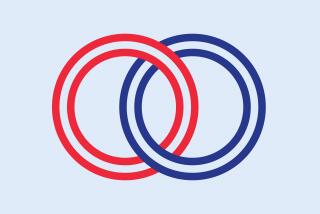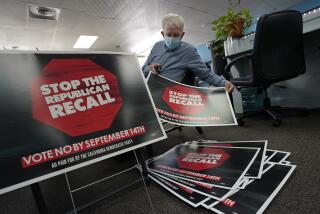Panel OKs Bill to Create 3rd State Election
- Share via
SACRAMENTO — A bill that would create a third statewide election in California next year gained momentum Wednesday in the Senate amid charges that the cost -- $30 million to $60 million -- would be wastefully high.
The proposal calls for splitting the regular March primary. In March, voters would cast ballots only in presidential races. A second primary, in June, would be for state and local candidates and issues. The general election runoff in November would remain.
Currently, California primaries, whether or not they involve a presidential election, are in March and are open to virtually all candidates and issues.
Under the legislation, only one primary would be held -- in June -- in nonpresidential election years.
Proponents of the bill by Assemblyman John Longville (D-Rialto) argued that a second primary would improve low turnouts by stimulating interest among apathetic voters. Another benefit, they said, is that in nonpresidential elections, the campaign season that now runs from March to November would be shorter and less expensive for candidates.
The bill, AB 1531, was approved on a 3-1 vote of the Senate Elections Committee, which recently endorsed a nearly identical measure, SB 430, by Sen. Ross Johnson (R-Irvine). It is pending in the Assembly.
The Johnson proposal would apply to elections starting in 2008. Longville’s bill originally would have made the election schedule changes permanent. But it was amended Wednesday to allow for a one-time experiment in 2004 to test how well the new arrangement would work.
Local government elections officials -- led by Conny McCormack, the Los Angeles County clerk and registrar of voters -- called such legislation a “completely unnecessary expense” at a time when state and local governments are making wholesale cuts in their budgets to overcome projected deficits.
McCormack said that Assembly staff consultants had estimated the extra cost of the bill at $30 million to $40 million statewide. But she said the California Assn. of Clerks and Elections Officials, which she heads, had calculated the price at up to $60 million, including $15 million for Los Angeles County alone.
“There is no reason at this time of fiscal crisis to decide that this is the year to experiment,” McCormack said. She said the current system of one primary in March has “worked fine.”
But outside the hearing room, Longville defended the higher expense as “trivial” compared with what he said was the more important issue of voters being able to choose “the best folks they can get ... to run the government.”
“The cost of conducting elections is far lower than the cost of not having effective elections,” he said. He added that in the context of the overall cost of government in California, the sum is “minuscule.”
“I just think this is a bad idea,” committee member Kevin Murray (D-Culver City) said of the Longville measure. He suggested that another election would put a new burden on the lives of harried Californians.
Last year, Gov. Gray Davis vetoed a similar bill, calling it a “recipe for mass confusion” that might have had the unintended consequence of “further discouraging voter interest.”
A spokesman for Davis said Wednesday that the governor had no position on either the Longville or Johnson bill.
For many years, California primaries were held in June. However, they were permanently advanced to March in 1998, mainly at the insistence of Democratic Party activists. They complained that because California’s primary occurred late in the presidential primary season, the most populous state lacked clout in choosing the parties’ White House nominees.
Moving the election to March, they reasoned, would make California competitive with early primary states such as New Hampshire and Iowa. However, some states then jumped their primaries ahead of California’s.
More to Read
Get the L.A. Times Politics newsletter
Deeply reported insights into legislation, politics and policy from Sacramento, Washington and beyond. In your inbox twice per week.
You may occasionally receive promotional content from the Los Angeles Times.










